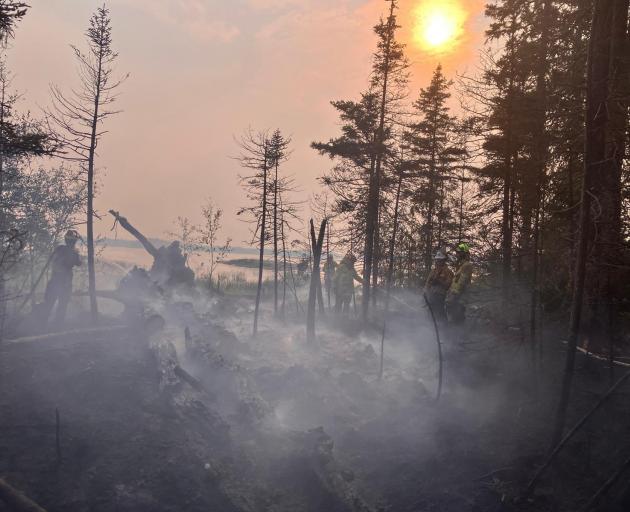
Five long weeks of battling wildfires in Canada day after day had an impact on seasoned Canterbury volunteer firefighter Tim Clark.
They were the worst wildfires the Hinds firefighter had ever experienced.
‘‘We saw and were involved in more action in these fires to previous ones I have been to in Canada,’’ Clark said.
‘‘This time we were right on the fire-front.’’
The area was very remote. Unlike Clark's previous trip to Canada, where they were flown in and out each day, this time they ‘‘spike camped’’, meaning they lived in single-person tents minutes from the fire.
‘‘Camping on the fire front with others from the team was a great experience and more productive.
“There were days when being (helicoptered) in due to smoke density we couldn’t get in,’’ Clark said.
He was a team leader on the deployment in the Manitoba province, which also included Ashburton firefighters Warren Maslin and Steve Ochsner.They were part of the Bravo contingent, made up of 43 Fire and Emergency NZ, Department of Conservation and forestry company firefighters.
The Manitoba fires have been the worst Canadians have experienced in 30 years.
Unlike the fires in Alberta, Canada, which Clark went to in 2023, the ground is flat in Manitoba.
It was understood many of the wildfires were started by lightning strikes.
‘‘The terrain made it easier to get around and control the fire,’’ he said.
With large areas of spruce boreal trees, the fire roared up the trunks, spreading quickly.
‘‘We were fortunate that water wasn’t an issue as there is more than 110,000 lakes around,’’ Clark said.
It was his third international deployment, having previously also been to Australia.
Clark has also fought New Zealand wildfires, including the Port Hills, Lake Ohau and Pigeon Bay blazes.
The firefighters were battling two fire fronts in Manitoba. One was spread across 400ha and the other 178,000ha. For comparison, Stewart Island is 168,000ha.Clark said the experiences and skills gained during his time away would be shared with colleagues in Canterbury and further afield through Fire and Emergency NZ.
The local communities and fellow emergency workers were always pleased to see the Kiwi firefighters turn up, he said.
‘‘We are well received by the locals and, for the firefighters, it’s a huge relief knowing they have this support,’’ Clark said.
But it was not all hard work - they enjoyed a barbecue with local firefighters and their families, followed by a game of water football.
It was played with a ball and fire hoses. There was also entertainment from the indigenous people of Pimicikamak Cree First Nation.

They were part of the second contingent of firefighters sent to the fire.
At the end of the five weeks, the fires they had been fighting were ‘‘being held’’ and not expected to get any bigger.
Clark said he was most grateful for the support of his family and employer, Goodyear Autocare Ashburton, who enabled him to deploy for lengthy periods.
Now that he is home and rested, Clark said he is awaiting the next call-up.
And with the fire seasons about to begin in New Zealand and Australia, the call could come at any time.














